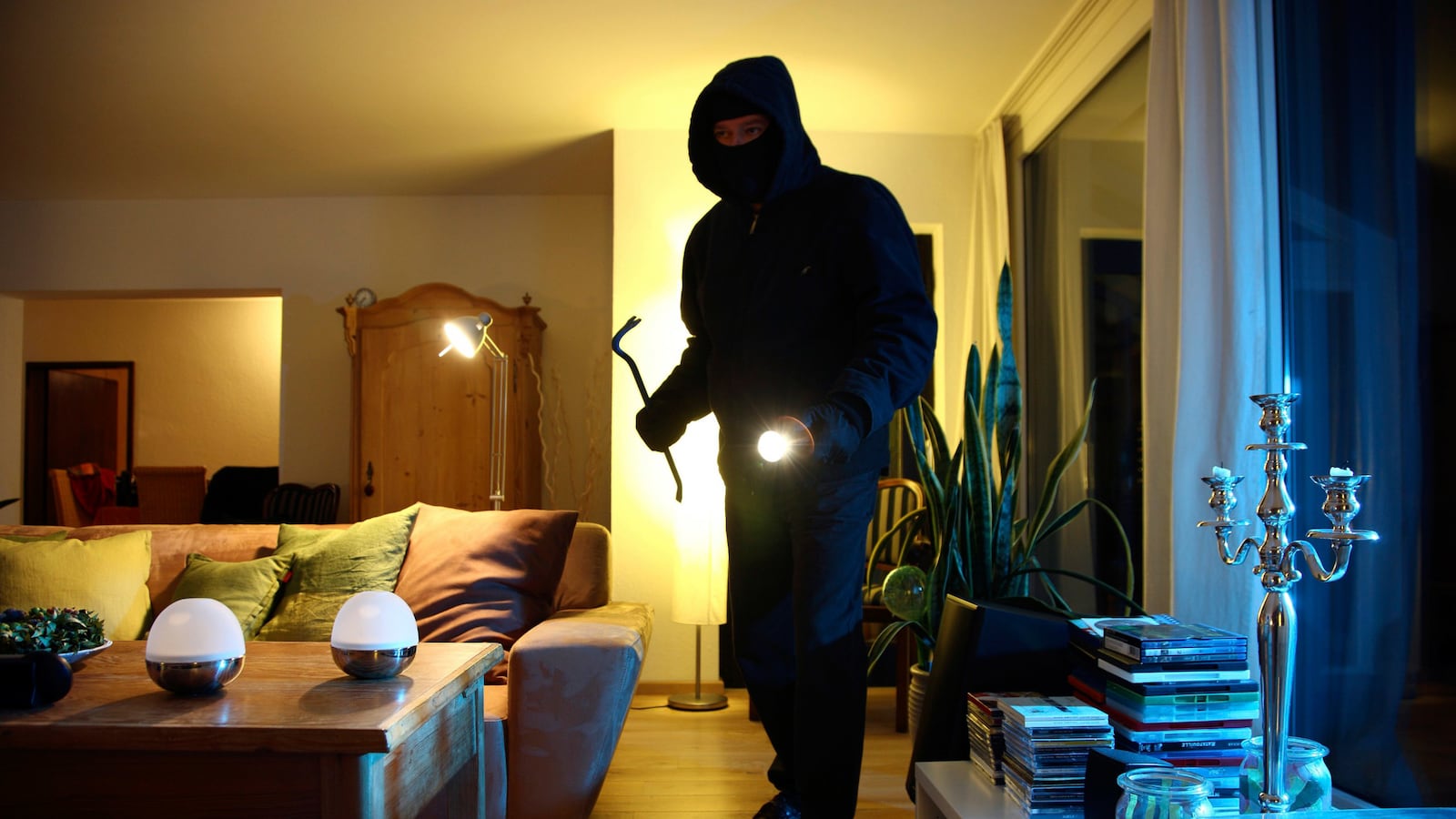“The first one was our neighbor across the street—he was very, very wealthy and we just didn’t like him,” said Cindy (not her real name), who broke into homes regularly when she was a teenager. “It was during the day, broad daylight. We played pool, and we ate, and I stole stupid things … it was an adrenaline rush. It felt like control. I was a really angry kid, and I didn’t feel bad about it.”
At some point on Tuesday, someone entered my home via an unlocked window, exiting a few minutes later through the front door with my laptop, four 1970s issues of Rolling Stone, assorted jewelry, and many other inexplicable items, including but not limited to a bottle of perfume and a copy of my book in Dutch.

Like everyone whose home gets broken into—nearly everyone, since a house is broken into every 14.3 seconds in the United States, and everyone I tell shares their nearly identical experience—I immediately began obsessing about who they were, what they had touched, where they’d been, how long they’d been in the house. I had theories—so many theories!—which I explained, in depth, to the responding officer and later the forensic examiner who gamely dusted for fingerprints.
"You wouldn't believe some of the things this camera has seen," he said as he took pictures of broken mirrors and ransacked drawers.
Had it happened while I sat in traffic? As that painfully earnest yoga instructor reminded all of us that “namasté” means “the light within me, and within all of us, always, honors and acknowledges the light within you?” If the burglar knew that laptop contained the pictures and videos of the last months of my beloved grandmother’s life, would that have made even a tiny bit of difference? (No, obviously.) Who is stupid enough to break into a house, but smart enough to appreciate Rolling Stone No. 149, the one with the Cameron Crowe Allman Brothers cover story?
“Most break-ins are a matter of opportunity. And that’s not to say that someone is just walking by and it occurs to them, like an impulse buy at a grocery story,” said Brian, who has worked as a security consultant for the past 10 years. Before that, when he was in the armed forces, one of his assignments was to act like a terrorist and physically infiltrate bases to find weaknesses. Burglars will, he said, nearly always have cased a house before breaking in.
“People feel violated, not only to be broken into but just to be cased is to be objectified in a really weird way ... to be targeted and objectified in that way is disconcerting. It doesn’t have to be two guys in a panel van; it could be the neighborhood kids that roll down the street a couple times a day and keep an eye on what looks easy.”
Now, when I see those same shady-looking guys rolling down the street on bikes with backpacks, I want to scream at them like a crazy person. Why is a grown-ass man riding a kid’s bike in the middle of the day? Fantasy-Me asks. Stop looking at this house! You already got everything, assholes! In my fantasy, this is enough to elicit a full confession, followed by an apology and prompt return of both my possessions and my sense of sanity.
One good way to reduce the chance of a burglary, Brian said, is to constantly vary your routine: park your car in different places each day. Sometimes, when you’re gone, leave the radio on; other times, off. You want to be unpredictable. “The more routine you are and the more you kind of telegraph your comings and goings, the easier it is to mark you,” he said.
At one point, Brian described it as a “best case scenario” that someone is trying to get into your house when no one is there “just to commit a property crime.” This put things right into perspective.
“I’ve been robbed more than I’ve broken into houses now,” said Cindy. “It’s such a violation. Back in 1991, we had this gorgeous VW bug that we’d completely restored, and someone stole it. And after I panicked and freaked out and called the police, I thought, ‘Oh. This is exactly what it was like for the people whose homes I broke into. Oh my God, it’s karma.’”
As I think about this nonstop, I’ve really gotten to let my fear and anger coalesce into bad ideas about how to prevent this relatively minor thing from happening again. Aside from, you know, the painfully obvious step of locking each and every window. Long-held political beliefs have gone right out the window, much to my shame.
A gun, I thought, maybe I should get a gun. I could get a shotgun, and not even purchase ammo, but just make that cocking noise. This is a bad plan, and totally impotent when it comes to preventing daytime break-ins. NRA stickers. Yes! I’ll put those AND a fake security sticker in the window.
“No,” the boyfriend says. “No, we’re not putting NRA stickers in the window. Those people are crazy and don’t care when 20 first graders get killed. We’re not supporting them.”
“But,” I argue, “but we could just get the stickers off eBay!”
“No,” he says, and adds, “I’ll bet if we got a KKK sticker that might deter people too, and we’re not doing that, either.”
Ultimately, it’s better to be a victim of your own stupidity and circumstance than a hypocrite, and so I have begrudgingly scaled down my revenge fantasies and instead secured the windows via dowels and new locks.
I want this person to go to jail. I want to smile while they shuffle off in chains.
I would also like them to have fair legal representation, an impartial jury and a sentence that is both proportionate to the crime and addresses their very likely substance abuse issues (unless the perp was just an asshole teenager. In that case, I want them to sit through 400 hours of excruciatingly boring classes about how and why breaking into houses is wrong, followed by doing a bunch of push-ups).
Because my disproportionate reaction is precisely why the law needs to be impartial. It is so easy to lose perspective when the fear, or the problem, or the injury is ours. It’s hard to be reasonable when you are afraid.






